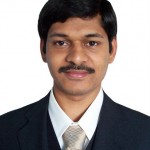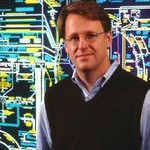Prof. Satish Narayana Srirama
University of Tartu, Estonia
Title: Mobile Web and Cloud Services Enabling Internet of Things
 Abstract:
Abstract:
The Internet of Things (IoT) represents a comprehensive environment that consists of large number of sensors and mediators interconnecting heterogeneous physical objects to the Internet. IoT applications can be found in many areas such as smart city, smart workplace, smart plants, smart agriculture and various ubiquitous computing areas. The research roadmap of IoT spans across vast domains such as mobile computing, wireless and sensor networks, service oriented computing, middleware, cloud computing and big data analytics. Primarily, the challenges associated with realization of IoT scenarios can be summarized across three layers: sensing and smart devices layer, connectivity layer and cloud layer. The first layer deals with the physical objects, the connectivity layer deals with the sensor data acquisition and provisioning, and the top cloud layer deals with resource provisioning for storage and processing of the acquired data in extracting domain specific information. The keynote takes the cross-layered approach and tries to address the primary challenges in IoT with mobile web and cloud services.
Bio:
Satish Narayana Srirama is an associate professor and head of the Mobile & Cloud Lab at the Institute of Computer Science, University of Tartu. He received his PhD in computer science from RWTH Aachen University, Germany. His current research focuses on cloud computing, mobile web services, mobile cloud, Internet of Things and migrating scientific computing and enterprise applications to the cloud.
[space height=”30″][divider scroll_text=””][space height=”30″]
Prof. Rizos Sakellariou
University of Manchester, UK
Title: Parallel Computing on the Cloud: from traditional execution time minimization to multiobjective optimization
The traditional view of parallel computing has focused on minimizing execution time. As the complexity and the costs associated with modern execution platforms and infrastructures grow, parallel execution time cannot be viewed as a single objective to meet at any cost. Instead, with such platforms consuming large amounts of energy, one needs to assess improvements in execution time against other types of cost. Cloud computing, despite sharing common origins with the traditional high-performance computing world, has grown to much more than it, following a resources-on-demand paradigm, where users can pay for what they need. However, the underlying infrastructure suffers from increasing complexity which is partly masked by having users pay for it.
In this respect, the talk will motivate the need to address efficiently the issues surrounding the use of multiple and/or heterogeneous resources offered by Cloud providers by capturing these issues as a multi-objective optimization problem, which requires a good understanding and appreciation of a number of different trade-offs. The talk will make this argument by presenting extensive experience and research on planning the parallel execution of scientific workflows on the Cloud in a way that tries to strike a balance between execution time and energy related costs.
Bio:
The speaker is with the School of Computer Science, University of Manchester.
He has been carrying research on a number of topics related to parallel and distributed computing for over 20 years. Further information about his past work: https://scholar.google.com/citations?user=5LPRRM8AAAAJ
[space height=”30″][divider scroll_text=””][space height=”30″]
Dr. Ian Foster
University of Chicago and Argonne National Lab, United States
Title: Accelerating discovery via science services
 Abstract:
Abstract:
We have made much progress over the past decade toward harnessing the collective power of IT resources distributed across the globe. In big-science projects in high-energy physics, astronomy, and climate, thousands work daily within virtual computing systems with global scope. But we now face a far greater challenge: Exploding data volumes and powerful simulation tools mean that many more–ultimately most?–researchers will soon require capabilities not so different from those used by such big-science teams. How are we to meet these needs? Must every lab be filled with computers and every researcher become an IT specialist? Perhaps the solution is rather to move research IT out of the lab entirely: to develop suites of science services to which researchers can dispatch mundane but time-consuming tasks, and thus to achieve economies of scale and reduce cognitive load. I explore the past, current, and potential future of large-scale outsourcing and automation for science, and suggest opportunities and challenges for today’s researchers. I use examples from Globus and other projects to demonstrate what can be achieved.
Bio:
Dr. Ian Foster is Director of the Computation Institute, a joint institute of the University of Chicago and Argonne National Laboratory. He is also an Argonne Senior Scientist and Distinguished Fellow, and the Arthur Holly Compton Distinguished Service Professor of Computer Science at University of Chicago. He is also involved with both the Open Grid Forum and with the Globus Alliance as an open source strategist. In 2006, he was appointed director of the Computation Institute, a joint project between the University of Chicago, and Argonne. An earlier project, Strand, received the British Computer Society Award for technical innovation. His research resulted in the development of techniques, tools and algorithms for high-performance distributed computing and parallel computing. As a result he is denoted as “the father of the Grid”. Foster led research and development of software for the I-WAY wide-area distributed computing experiment, which connected supercomputers, databases and other high-end resources at 17 sites across North America in 1995. His own labs, the Distributed Systems Laboratory is the nexus of the multi-institute Globus Project, a research and development effort that encourages collaborative computing by providing advances necessary for engineering, business and other fields. Furthermore the Computation Institute addresses many of the most challenging computational and communications problems facing Grid implementations today. In 2004, he founded Univa Corporation, which was merged with United Devices in 2007 and operate under the name Univa UD. Foster’s honors include the Lovelace Medal of the British Computer Society, the Gordon Bell Prize for high-performance computing (2001), as well as others. He was elected Fellow of the American Association for the Advancement of Science in 2003. Dr. Foster also serves as PI or Co-PI on projects connected to the DOE global change program, the National Computational Science Alliance, the NASA Information Power Grid project, the NSF Grid Physics Network, GRIDS Center, and International Virtual Data Grid Laboratory projects, and other DOE and NSF programs. His research is supported by DOE, NSF, NASA, Microsoft, and IBM.
